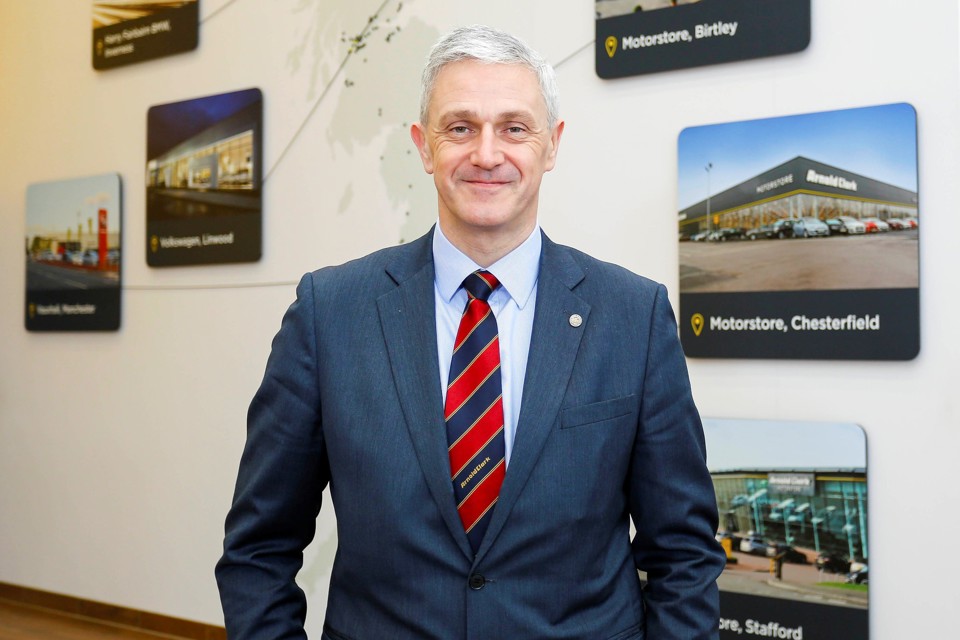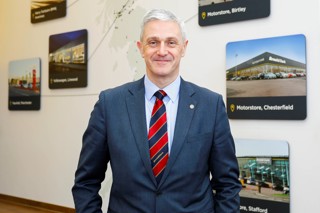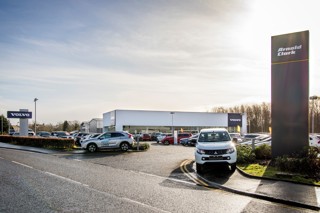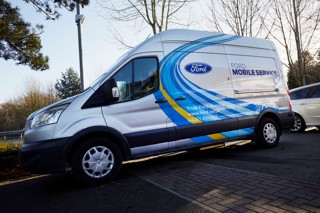Arnold Clark chief executive Eddie Hawthorne has told AM that he initially felt that the COVID-19 coronavirus crisis would be “over by Easter”, but now concedes it has fundamentally changed car retail.
Hawthorne said that his first reaction had been that the health crisis would have “all blown over in two to three weeks” but asked “how naive was I?” in an honest appraisal of his initial reaction to the crisis as he discussed its eventual impact on the Glasgow-based AM100 group.
Arnold Clark’s leadership team did ultimately take the decision to close its 200 dealerships in the first week of March, well before Prime Minister Boris Johnson’s official decision to implement the March 24 COVID-19 lockdown, and Hawthorne said that he has been “extremely impressed” by the response of its 11,500 colleagues.
“There have been temporary reductions in pay for those on furlough and senior members of staff who kept on working, as well as concerns about health and safety, but the overall response by the business has been phenomenal,” said the boss of the group, which won the AM Awards 2020's Dealer Group of the Year, Best Dealer Group (more than 10 sites) and Best Used Car Dealer Group (franchised and independent) accolades.
Retained business
Hawthorne told AM that the group was currently managing to sell around 750 cars each day, with the support of its established online sales team and specialist click and collect vehicle handover centres.
Folllowing their June 1 reopening, its English car retail sites are handling around 75% of their usual sales volume.
The group maintained around 22% of its aftersales business in May, rising to 50% this month and Hawthorne said that the business intends to have around 75% of its technicians back by the end of this month.
Last year Arnold Clark's annual financial results for the year up to December 31, 2018, revealed a 6.5% increase in pre-tax profits (to £113.5m) turnover rose by 7.8% (to £4.24bn) after growth in used car sales volumes helped to counteract the effects of a decline car retail market.
But, fresh from getting the group's 2019 financial results "over the line", Hawthorne said that the group was “starting June with a loss and we’ve yet to determine exactly how big that will be.”
He added: “We won’t make the money that we made last year. I’d like to think that we could (achieve profitability) but if that number is a negative then we are pretty resigned to that and we have to reason that there was a good reason for that.”
Arnold Clark still has around 8,500 of its staff on furlough under the Government’s coronavirus job retention scheme (CJRS).
In England around 60% of staff are now back at work, Hawthorne said.
“The challenge we have in returning staff is that when you have 20% of your staff in a dealership it’s quite easy to implement social distancing measures,” he said. “As that number rises it gets increasingly difficult.”
As well as video training videos designed to prepare staff for their safe return to work, Hawthorne said that he has been sending out weekly memos to keep staff updated about the progress of the business and the health and safety measures it has taken.
He said: “I’ve made it extremely clear to all our staff that COVID has fundamentally changed the business. The Arnold Clark they left in mid-March is not the Arnold Clark that they will be returning to.”
Looking towards a restructure
Asked about Lookers’ recently announced plans to close 12 more of its dealerships and make up to 1,500 staff redundant to save cash following issues in the business which had already been announced prior to the COVID crisis, Hawthorne said that he expected businesses across the sector to struggle.
He said that Arnold Clark had accelerated its own plans to close “a handful of smaller showrooms and other which do not make economic sense” as a result of the COVID-19 crisis.
But Hawthorne added that the group also planned to proceed with plans to open “two or three” new dealerships in England over the coming three months.
“Like any business we’re going to look at restructuring,” he said, but part of the plan remained to “protect as many jobs as we can”.
Hawthorne said that the Arnold Clark business was financially strong and had gained support from its banks and other lenders during lockdown.
But he warned that the fast start demanded by some car manufacturers could threaten smaller, more vulnerable car retail businesses.
He said: “You simply cannot simply start aiming to achieve a certain sales volume by the end of June. You’ll have dealers at different stages of financial viability. Just to go back to where we were pre-lockdown isn’t an option anymore.
“We are not going to go back to where we were because just sitting on huge a huge stock of vehicles like we were and shifting them out at pace cannot happen when the demand’s not there.”



















Login to comment
Comments
No comments have been made yet.